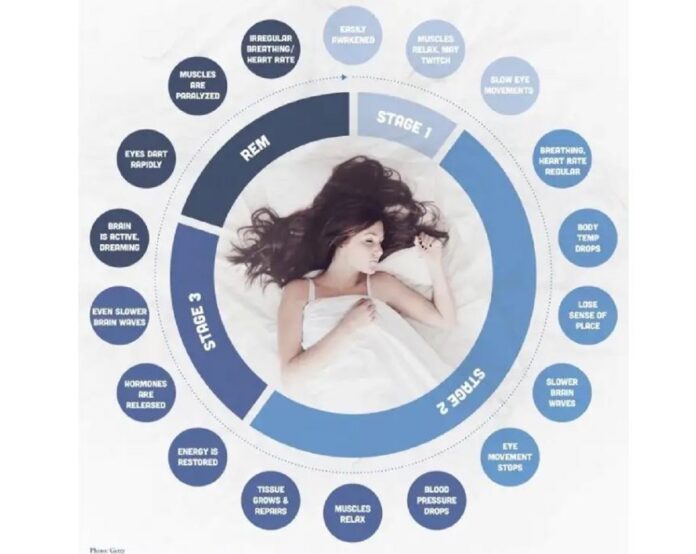Sleep is essential for maintaining good mental health. It plays a crucial role in regulating mood, memory, and cognitive function. Lack of sleep can lead to a variety of mental health issues such as depression, anxiety, and irritability. It can also affect decision-making, problem-solving, and overall cognitive performance. Getting enough quality sleep is important for maintaining good mental health and overall well-being.
Read More: Sayed Quraishi
Dreaming of a Better Mental Health: The Importance of Sleep
When it comes to maintaining good mental health, many people overlook the importance of sleep. Sleep is often seen as a luxury rather than a necessity, but the truth is that it plays a crucial role in regulating our mood, memory, and cognitive function. In fact, lack of sleep can lead to a variety of mental health issues such as depression, anxiety, and irritability.
One of the main ways that sleep affects our mental health is through its impact on the regulation of mood. Studies have shown that people who get less than 7 hours of sleep per night are more likely to experience symptoms of depression and anxiety. This is because sleep plays a key role in regulating the levels of certain neurotransmitters in the brain, such as serotonin and dopamine, which are responsible for regulating our mood.
Another important aspect of sleep that affects our mental health is its impact on memory and cognitive function. During sleep, our brain is busy consolidating and organizing the information we’ve learned during the day. This process is essential for maintaining our ability to learn and remember new information. Studies have also shown that lack of sleep can impair our ability to focus, concentrate, and make decisions. This is why it’s so important to make sure that we’re getting enough quality sleep each night.
So, how can we ensure that we’re getting enough sleep to maintain good mental health? One of the most important things to do is to establish a regular sleep schedule. This means going to bed and waking up at the same time each day, even on weekends. It’s also important to create a comfortable and relaxing sleep environment, such as keeping your bedroom cool, dark, and quiet. Additionally, try to avoid electronic devices for at least an hour before bed as the blue light emitted by these devices can disrupt our natural melatonin production and make it harder to fall asleep.
In conclusion, while we might think of sleep as a luxury, it’s actually a necessity when it comes to maintaining good mental health. By ensuring that we’re getting enough quality sleep each night, we can help to regulate our mood, improve our memory and cognitive function, and reduce our risk of developing mental health issues such as depression and anxiety. So, next time you’re tempted to sacrifice your sleep for something else, remember that a good night’s sleep is key to maintaining a healthy mind and body.
Sleeping Your Way to a Healthier Mind
When it comes to maintaining good mental health, many people overlook the importance of sleep. Sleep is often seen as a luxury rather than a necessity, but the truth is that it plays a crucial role in regulating our mood, memory, and cognitive function. In fact, lack of sleep can lead to a variety of mental health issues such as depression, anxiety, and irritability.
One of the main ways that sleep affects our mental health is through its impact on the regulation of mood. Studies have shown that people who get less than 7 hours of sleep per night are more likely to experience symptoms of depression and anxiety. This is because sleep plays a key role in regulating the levels of certain neurotransmitters in the brain, such as serotonin and dopamine, which are responsible for regulating our mood.
But the effects of sleep on mental health are not limited to mood regulation. Sleep also plays a crucial role in maintaining cognitive functions such as memory, attention, and problem-solving abilities. Research has shown that people who don’t get enough sleep are more likely to have difficulty with memory, problem-solving, and decision-making. Additionally, poor sleep can also lead to an overall lack of focus and concentration, making it harder to accomplish daily tasks.
In addition to its effects on mental health, sleep is also important for physical health. Chronic lack of sleep has been linked to an increased risk of various health conditions such as heart disease, diabetes, and obesity. This is because sleep plays a role in regulating the hormones that control appetite, which can lead to weight gain if not regulated properly.
So, how can you ensure that you’re getting enough sleep to maintain good mental health? One of the most important things to do is to establish a regular sleep schedule. This means going to bed and waking up at the same time each day, even on weekends. It’s also important to create a comfortable and relaxing sleep environment, such as keeping your bedroom cool, dark, and quiet. Additionally, try to avoid electronic devices for at least an hour before bed as the blue light emitted by these devices can disrupt our natural melatonin production and make it harder to fall asleep.
In conclusion, sleep is not only a vital part of physical health, but it’s also crucial for maintaining good mental health. A good night’s sleep can help to regulate our mood, improve our memory and cognitive function, and reduce our risk of developing mental health issues such as depression and anxiety. So, next time you’re tempted to sacrifice your sleep for something else, remember that a good night’s sleep is key to maintaining a healthy mind and body.
Also, Read More: A Guide to Maintaining Mental Well-being
The Mental Health Benefits of a Good Night’s Sleep
Many people often overlook the importance of sleep in maintaining good mental health, but the truth is that it plays a crucial role in regulating our mood, memory, and cognitive function. In fact, lack of sleep can lead to a variety of mental health issues such as depression, anxiety, and irritability. In this article, we will discuss the various mental health benefits of getting a good night’s sleep.
The first benefit of a good night’s sleep is its impact on the regulation of mood. Studies have shown that people who get less than 7 hours of sleep per night are more likely to experience symptoms of depression and anxiety. This is because sleep plays a key role in regulating the levels of certain neurotransmitters in the brain, such as serotonin and dopamine, which are responsible for regulating our mood. When we get enough sleep, these neurotransmitters are balanced, and our mood stays stable, but when we don’t, they become imbalanced, leading to mood swings and emotional instability.
Another benefit of a good night’s sleep is its impact on memory and cognitive function. During sleep, our brain is busy consolidating and organizing the information we’ve learned during the day. This process is essential for maintaining our ability to learn and remember new information. Studies have also shown that lack of sleep can impair our ability to focus, concentrate, and make decisions. So, getting enough sleep can help us to perform better at work, school, and other daily activities.
Good sleep also helps to reduce stress and anxiety levels. Studies have shown that people who sleep well have lower levels of the stress hormone cortisol in their bodies. Additionally, sleep is also known to help reduce anxiety symptoms, as it allows the brain to process and cope with negative thoughts and emotions.
A good night’s sleep also helps to boost our immune system. Sleep is essential for repairing and restoring the body. During sleep, the body produces cytokines, which are a type of protein that help to fight off infection and inflammation. Additionally, sleep is also known to help regulate the immune system, making it more resilient to stress and illness.
In conclusion, getting a good night’s sleep is essential for maintaining good mental health. It plays a crucial role in regulating our mood, memory, and cognitive function. Additionally, it also helps to reduce stress and anxiety levels, and boost our immune system. So, make sure you establish a regular sleep schedule, create a comfortable and relaxing sleep environment, and avoid electronic devices for at least an hour before bed to ensure that you get a good night’s sleep. A good night’s sleep is key to maintaining a healthy mind and body.
Nighttime Nurturing: How Sleep Improves Mental Wellness
When it comes to maintaining good mental health, many people overlook the importance of sleep. Sleep is often seen as a luxury rather than a necessity, but the truth is that it plays a crucial role in regulating our mood, memory, and cognitive function. In this article, we will discuss how sleep can improve mental wellness.
The first way that sleep improves mental wellness is by regulating our mood. Studies have shown that people who get less than 7 hours of sleep per night are more likely to experience symptoms of depression and anxiety. This is because sleep plays a key role in regulating the levels of certain neurotransmitters in the brain, such as serotonin and dopamine, which are responsible for regulating our mood. When we get enough sleep, these neurotransmitters are balanced, and our mood stays stable, but when we don’t, they become imbalanced, leading to mood swings and emotional instability.
Another way that sleep improves mental wellness is by improving memory and cognitive function. During sleep, our brain is busy consolidating and organizing the information we’ve learned during the day. This process is essential for maintaining our ability to learn and remember new information. Studies have also shown that lack of sleep can impair our ability to focus, concentrate, and make decisions. So, getting enough sleep can help us to perform better at work, school, and other daily activities.
Sleep also plays a crucial role in reducing stress and anxiety levels. Studies have shown that people who sleep well have lower levels of the stress hormone cortisol in their bodies. Additionally, sleep is also known to help reduce anxiety symptoms, as it allows the brain to process and cope with negative thoughts and emotions.
Good sleep also helps in reducing the risk of developing mental illnesses such as depression and anxiety. Research has shown that chronic insomnia is one of the most common risk factors for developing mental illnesses. Getting enough sleep can help to reduce the risk of developing these illnesses and improve overall mental wellness.
In conclusion, sleep is an essential part of maintaining good mental health. It plays a crucial role in regulating our mood, memory, and cognitive function. Additionally, it also helps to reduce stress and anxiety levels, boost our immune system and reduce the risk of developing mental illnesses. Nighttime nurturing through good quality sleep is a simple yet powerful way to improve mental wellness. So, establish a regular sleep schedule, create a comfortable and relaxing sleep environment, and avoid electronic devices for at least an hour before bed to ensure that you get a good night’s sleep. Remember, a good night’s sleep is key to maintaining a healthy mind and body.
A Sound Mind in a Sound Sleep: The Connection between Sleep and Mental Health
Sleep and mental health are closely connected. A good night’s sleep is essential for maintaining good mental health, while lack of sleep can lead to a variety of mental health issues such as depression, anxiety, and irritability. In this article, we will explore the connection between sleep and mental health, and how getting enough quality sleep can improve our overall well-being.
One of the main ways that sleep affects our mental health is through its impact on the regulation of mood. Studies have shown that people who get less than 7 hours of sleep per night are more likely to experience symptoms of depression and anxiety. This is because sleep plays a key role in regulating the levels of certain neurotransmitters in the brain, such as serotonin and dopamine, which are responsible for regulating our mood. When we get enough sleep, these neurotransmitters are balanced, and our mood stays stable, but when we don’t, they become imbalanced, leading to mood swings and emotional instability.
Another important aspect of sleep that affects our mental health is its impact on memory and cognitive function. During sleep, our brain is busy consolidating and organizing the information we’ve learned during the day. This process is essential for maintaining our ability to learn and remember new information. Studies have also shown that lack of sleep can impair our ability to focus, concentrate, and make decisions. This is why it’s so important to make sure that we’re getting enough quality sleep each night.
Not only it affects our mood, memory and cognitive function, but sleep also plays a role in reducing stress and anxiety levels. Studies have shown that people who sleep well have lower levels of the stress hormone cortisol in their bodies. Additionally, sleep is also known to help reduce anxiety symptoms, as it allows the brain to process and cope with negative thoughts and emotions.
Chronic lack of sleep has also been linked to an increased risk of developing mental illnesses such as depression and anxiety. Additionally, poor sleep can also worsen symptoms for those who are already suffering from mental health conditions. This is why it is crucial for individuals with mental health conditions to prioritize getting enough sleep as part of their overall treatment plan.
In conclusion, sleep is a vital aspect of maintaining good mental health. A good night’s sleep can help to regulate our mood, improve our memory and cognitive function, reduce stress and anxiety levels and reduce the risk of developing mental illnesses. So, establish a regular sleep schedule, create a comfortable and relaxing sleep environment, and avoid electronic devices for at least an hour before bed to ensure that you get a good night’s sleep. A sound mind in a sound sleep is the key to overall well-being.







